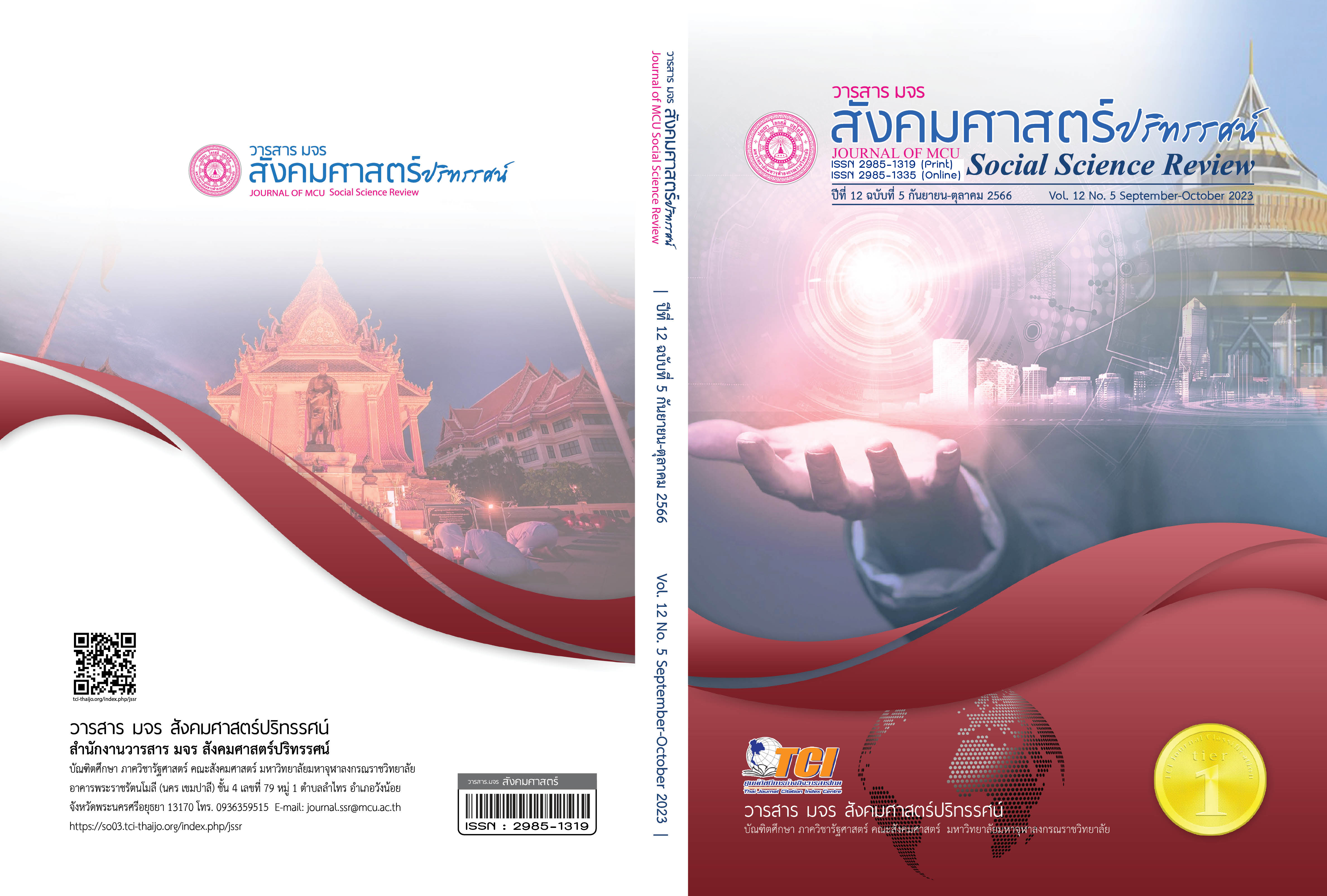รูปแบบความสัมพันธ์โครงสร้างเชิงเส้นของปัจจัยที่ส่งผลต่อการเป็นชุมชน การเรียนรู้ทางวิชาชีพของโรงเรียนมัธยมศึกษา สังกัดสำนักงานคณะกรรมการ การศึกษาขั้นพื้นฐานในภาคตะวันออกเฉียงเหนือ
คำสำคัญ:
ความสัมพันธ์โครงสร้างเชิงเส้น, ชุมชนการเรียนรู้ทางวิชาชีพบทคัดย่อ
บทความวิจัยนี้มีวัตถุประสงค์เพื่อ 1. ศึกษารูปแบบความสัมพันธ์โครงสร้างเชิงเส้นของปัจจัยที่ส่งผลต่อการเป็นชุมชนการเรียนรู้ทางวิชาชีพของโรงเรียนมัธยมศึกษา และ 2. ตรวจสอบความสอดคล้องระหว่างรูปแบบความสัมพันธ์โครงสร้างเชิงเส้นของปัจจัยที่ส่งผลต่อการเป็นชุมชนการเรียนรู้ทางวิชาชีพของโรงเรียนมัธยมศึกษา สังกัดสำนักงานคณะกรรมการการศึกษาขั้นพื้นฐานในภาคตะวันออกเฉียงเหนือกับข้อมูลเชิงประจักษ์ เป็นการวิจัยแบบผสานวิธี โดยใช้แบบสอบถามเป็นเครื่องมือเก็บข้อมูล กลุ่มตัวอย่างคือ ผู้บริหารและครูผู้สอนโรงเรียนมัธยมศึกษา จำนวน 550 คน วิเคราะห์ข้อมูลด้วยค่าเฉลี่ย ส่วนเบี่ยงเบนมาตรฐาน และการวิเคราะห์สมการเชิงโครงสร้าง
ผลการวิจัยพบว่า 1. รูปแบบความสัมพันธ์โครงสร้างเชิงเส้นของปัจจัยที่ส่งผลต่อการเป็นชุมชนการเรียนรู้ทางวิชาชีพของโรงเรียน ประกอบด้วย 5 ปัจจัย คือ 1) ภาวะผู้นำการเปลี่ยนแปลงของผู้บริหาร 2) บรรยากาศและวัฒนธรรม 3) วิสัยทัศน์ พันธกิจและยุทธศาสตร์ 4) การรับรู้ความสามารถร่วมกันของครู และ 5) โครงสร้างโรงเรียน 2. รูปแบบที่พัฒนาขึ้นมีความสอดคล้องกับข้อมูลเชิงประจักษ์ โดยมีค่า Chi-square = 116.88, df = 97, p-value = 0.08, 𝜒2/df = 1.20, RMSEA = 0.01, GFI = 0.98, AGFI = 0.94 โดยการเป็นชุมชนการเรียนรู้ทางวิชาชีพของโรงเรียนได้รับอิทธิพลทางตรงจากโครงสร้างโรงเรียน ได้รับอิทธิพลทางอ้อมจากตัวแปรภาวะผู้นำการเปลี่ยนแปลงของผู้บริหารโดยผ่านตัวแปรโครงสร้างโรงเรียน และได้รับอิทธิพลรวมสูงสุดจากตัวแปรภาวะผู้นำการเปลี่ยนแปลงของผู้บริหาร
เอกสารอ้างอิง
กวิสรา ชื่นอุรา. (2560). รูปแบบการพัฒนาโรงเรียนส่งเสริมการคิดโดยใช้ชุมชนการเรียนรู้ทางวิชาชีพเป็นฐานสำหรับโรงเรียนในสังกัดสำนักงานคณะกรรมการการศึกษาขั้นพื้นฐาน (ดุษฎีนิพนธ์การศึกษาศาสตรดุษฎีบัณฑิต สาขาการบริหารและพัฒนา การศึกษา). มหาสารคาม: มหาวิทยาลัยมหาสารคาม.
กัญญาภัค เฮงใจบุญ. (2555). การวิเคราะห์ปัจจัยเชิงสาเหตุที่มีอิทธิพลต่อการเป็นองค์การแห่งการเรียนรู้ของสถานศึกษาขั้นพื้นฐาน สังกัดสำนักงานเขตพื้นที่การศึกษาประถมศึกษา (ดุษฎีนิพนธ์การศึกษาศาสตรดุษฎีบัณฑิต สาขาการบริหารการศึกษาและผู้นำการเปลี่ยนแปลง). ปทุมธานี: มหาวิทยาลัยอีสเทิร์นเอเชีย.
นงลักษณ์ วิรัชชัย. (2542). โมเดลลิสเรล : สถิติวิเคราะห์สำหรับการวิจัย (พิมพ์ครั้งที่3). กรุงเทพฯ: โรงพิมพ์จุฬาลงกรณ์มหาวิทยาลัย.
นวลลออ พลรักษา. (2561). โมเดลสมการโครงสร้างปัจจัยที่มีอิทธิพลต่อการเป็นชุมชนแห่งการเรียนรู้ทางวิชาชีพสำหรับสถานศึกษาขั้นพื้นฐาน (ดุษฎีนิพนธ์ปรัชญาดุษฎีบัณฑิต สาขาการบริหารการศึกษา). ขอนแก่น: มหาวิทยาลัยขอนแก่น.
บุญชม ศรีสะอาด. (2545). การวิจัยเบื้องต้น (พิมพ์ครั้งที่ 2). กรุงเทพฯ: สุวีริยาสาส์น.
ลออง วัจนะสาลิกากุล. (2557). การพัฒนารูปแบบความสัมพันธ์เชิงสาเหตุของปัจจัยที่มีอิทธิพลต่อการเป็นองค์การแห่งการเรียนรู้ของสถานศึกษา สังกัดสำนักงานคณะกรรมการการอาชีวศึกษา (ดุษฎีนิพนธ์ครุศาสตรดุษฎีบัณฑิต สาขาการบริหารการศึกษา). ปทุมธานี: มหาวิทยาลัยราชภัฏวไลยอลงกรณ์.
วรลักษณ์ ชูกำเนิด. (2557). รูปแบบชุมชนการเรียนรู้ทางวิชาชีพครูสู่การเรียนรู้ในศตวรรษที่ 21 บริบทโรงเรียนในประเทศไทย (ดุษฎีนิพนธ์การศึกษาศาสตรดุษฎีบัณฑิต สาขาการ บริหารการศึกษา). สงขลา: มหาวิทยาลัยสงขลานครินทร์.
สหัส แก้วยัง. (2561). การศึกษาไทย ไปถึงไหนแล้ว ?. สืบค้น 19 พฤษภาคม 2563, จาก https://www.kroobannok.com/85178
สำนักงานคณะกรรมการการศึกษาขั้นพื้นฐาน. (2564). ระบบสารสนเทศเพื่อการบริหารการศึกษา (Education Management Information System : EMIS). สืบค้น 15 กรกฎาคม 2564, จาก https://data.bopp-obec.info
สำนักงานเลขาธิการสภาการศึกษา. (2563). สภาวะการศึกษาไทย 2561-2562 การปฏิรูป การศึกษาในยุคดิจิทัล. นนทบุรี: ภาพพิมพ์.
สุเทพ พงศ์ศรีวัฒน์. (2556). ภาวะผู้นำ : ทฤษฎีและปฏิบัติศาสตร์และศิลป์สู่ความเป็นผู้นำที่สมบูรณ์. กรุงเทพฯ: วิรัตน์เอ็ดคูเคชั่น.
อภิสิทธิ์ อุคำ. (2563). รูปแบบความสัมพันธ์เชิงสาเหตุของปัจจัยที่ส่งผลต่อการเป็นชุมชนแห่ง การเรียนรู้วิชาชีพของโรงเรียนประถมศึกษาสังกัดสำนักงานคณะกรรมการการศึกษาขั้นพื้นฐานในภาคตะวันออกเฉียงเหนือ (ดุษฎีนิพนธ์ปรัชญาดุษฎีบัณฑิต สาขาการบริหารและพัฒนาการศึกษา). สกลนคร: มหาวิทยาลัยราชภัฏสกลนคร.
Davis, K. & Newstrom, J.W. (1989). Human Behavior at Work: Organizational Behavior. New York: McGraw-Hill.
Koontz, H. & Weihrich, H. (1990). Essentials of Management. New York: Mc Graw -Hill Publishing Company.
ดาวน์โหลด
เผยแพร่แล้ว
รูปแบบการอ้างอิง
ฉบับ
ประเภทบทความ
สัญญาอนุญาต
ลิขสิทธิ์ (c) 2023 วารสาร มจร สังคมศาสตร์ปริทรรศน์

อนุญาตภายใต้เงื่อนไข Creative Commons Attribution-NonCommercial-NoDerivatives 4.0 International License.
เพื่อให้เป็นไปตามกฎหมายลิขสิทธิ์ ผู้นิพนธ์ทุกท่านต้องลงลายมือชื่อในแบบฟอร์มใบมอบลิขสิทธิ์บทความให้แก่วารสารฯ พร้อมกับบทความต้นฉบับที่ได้แก้ไขครั้งสุดท้าย นอกจากนี้ ผู้นิพนธ์ทุกท่านต้องยืนยันว่าบทความต้นฉบับที่ส่งมาตีพิมพ์นั้น ได้ส่งมาตีพิมพ์เฉพาะในวารสาร มจร สังคมศาสตร์ปริทรรศน์ เพียงแห่งเดียวเท่านั้น หากมีการใช้ภาพหรือตารางหรือเนื้อหาอื่นๆ ของผู้นิพนธ์อื่นที่ปรากฏในสิ่งตีพิมพ์อื่นมาแล้ว ผู้นิพนธ์ต้องขออนุญาตเจ้าของลิขสิทธิ์ก่อน พร้อมทั้งแสดงหนังสือที่ได้รับการยินยอมต่อบรรณาธิการ ก่อนที่บทความจะได้รับการตีพิมพ์ หากไม่เป็นไปตามข้อกำหนดเบื้องต้น ทางวารสารจะถอดบทความของท่านออกโดยไม่มีข้อยกเว้นใดๆ ทั้งสิ้น





